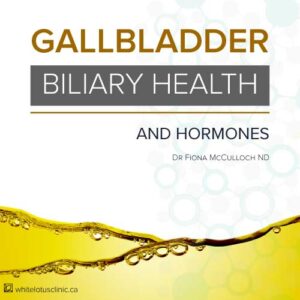Gallbladder, Biliary Health and Hormones
- insulin resistance
- fatty liver disease
- rapid weight loss
- high levels of estrogen
- Hypothyroidism
- Certain Medications
- Hormonal changes
(e.g. around pregnancy or in perimenopause)
Insulin resistance and fatty liver disease change the composition and movement of the bile. Hypothyroidism has been also been found to increase the formation of gallstones and change the quality of bile.
High levels of estrogen in general, or in pregnancy are known to trigger biliary problems.

Birth control pills and new medications for diabetes such as Ozempic, Saxenda or Victoza have been linked to gallbladder or biliary diseases, especially when used long term.
Rapid weight loss has been found to change the ratio of bile salt to cholesterol in the gallbladder, predisposing to the formation of stones.
Given that many of the above causes can apply to patients with PCOS, it isn't surprising that they are 3x more likely to develop gallbladder disease. To watch Dr. Fiona's Instagram reel on Gallbladder problems and PCOS click here.
Even without PCOS, it's extremely common to experience gallbladder or biliary concerns at some point in life.
Biliary problems can include
- "Sludge" (change in the composition of the bile)
- "Sluggish" bile flow (change in the movement of the bile)
- Gallstones
- usually made from cholesterol
- sometimes made from bilirubin (pigment)
- Biliary pain or colic (also known as cholcystitis)
- Ongoing digestive symptoms after removal of the gallbladder
Common symptoms of gallbladder problems
- Bloating or burping after meals
- Loose or urgent stools
- Pale stools
- Discomfort or indigestion after consuming meals higher in fats
- Right-sided or middle abdominal pain under the ribcage.
(May radiate to the back around the shoulder blade)
Biliary problems can be confusing. Despite great discomfort, many patients do not show stones on ultrasound. Yet, many patients have significant biliary problems without gallstones. This method of diagnosis alone can be problematic as many problems cannot be seen on ultrasound.
Some patients have such severe gallstones that they must remove their gallbladder. At times, this can provide great relief and is the best or only option if the pain is severe.
Unfortunately, some who have had their gallbladder removed suffer with ongoing loose stools, bloating and poor digestion of fats. Fortunately, there are treatments to help with this.
How To Naturally Support Your Gallbladder and Biliary Health
To support gallbladder and biliary health, it's important to look for the underlying causes of gallbladder problems. Lab tests can help to look for insulin resistance, cholesterol, levels of hormones like thyroid, estrogen and progesterone, and markers for fatty liver disease.
Once that's been taken care of, we begin by treating the cause.
Gallbladder-Supportive Foods
- Lemon
- Artichokes
- Beets
- Bitter tasting vegetables (ie: dandelion greens, endive, chicory)
- Colourful variety of vegetables (anti-inflammatory)
Lifestyle Habits
- Chew Your Food Well (mom was right, again!)
- Apple Cider Vinegar can be taken before meals
- Exercise regularly
- Avoid fried and processed foods
- Avoid extreme caloric restriction and rapid weight loss
follow a moderate pace instead
Supplements
If you are a patient with us, you can ask your ND. (Supplements can vary greatly between patients)
- Soluble and Insoluble fibres
- Supplements to support healthy bile production, fat emulsification and gallbladder health
- Supplements to support biliary function after gallbladder removal
- Supplements or Treatments to address underlying causes of biliary system problems.
With the right support, many patients can experience relief from this common problem!




